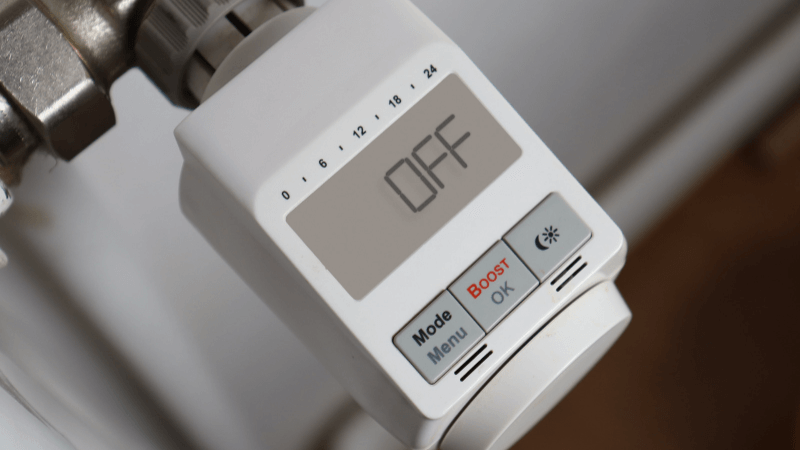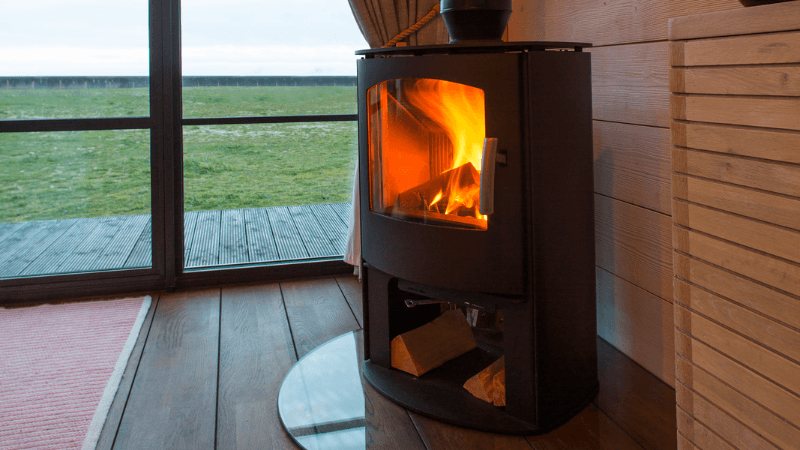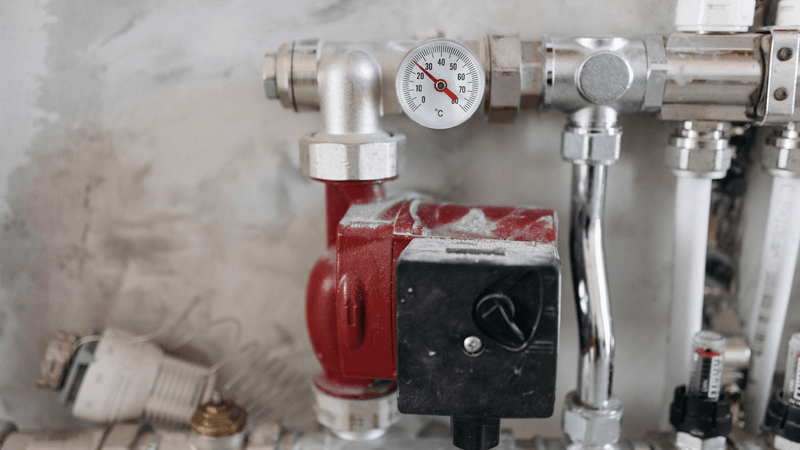With the cost of living rising, you might be worried about your heating expenses. You want to reduce the cost, but you don’t want to be cold this winter either. Never fear — there are plenty of ways you can save money on heating without getting frostbite!
Read on to find advice on some of the most common questions about how to save money on heating. Discover which heating-saving tips are myths and which methods genuinely work, helping you significantly reduce your heating bill cost.

How To Save Money On Heating: Your Questions Answered
Does turning down radiators save money on heating?
It might seem like common sense that turning down radiators saves money on heating bills. But counter-intuitively, that’s actually not the case.
If your main thermostat is on at a specific temperature, your radiators won’t stop until the room they’re in reaches that heat. This means you don’t save money if you turn your radiators down unless you completely turn them off.
Will a log burner save you money?
Because wood costs less to burn than other fuels, a log burner can save you money on heating. Quite a lot of money, in fact.
Some users report saving as much as 25% on their energy bills by switching to a log burner instead of radiators.

There are nuances here when it comes to the best way to save money. A wood-burning stove saves more money than an open fire, for instance. And it’s important to remember that installing a log burner costs at least £2,000 GBP (€2,275 EUR/$2,470 USD) upfront — but it could be worth it in the long term.
Will a new boiler save you money?
Just like any other item in your house, boilers are subject to wear and tear. Over time, they lose their efficiency, leading to increased heating costs. An old boiler that no longer works effectively could cost you hundreds each year.
Upgrading your boiler can save around 20–30% on energy bills. How much you save depends on your property size, energy provider tariff, property insulation and other aspects that impact overall heating costs. But it’s certainly worth considering whether a new boiler will save you money if your current boiler is old.
Will a smart meter save you money?
A smart meter works by automatically sending meter readings to your energy supplier. This helps ensure your bills are accurate, which saves you money on your bills if they were inaccurate previously.
A smart meter can also save you money by showing you where your spending is going. Smart meters provide insights into how different electricals and appliances impact your monthly bill, so you can change your usage of these or upgrade the model you have to make savings.
Is it cheaper to have your heating on low all day?
There is a common myth that having your heating turned on at a low temperature all day saves you money. This derives from the idea that appliances use more energy to heat up than they would if just left on. However, this has been proven to not be the case.
So, what is the cheapest way to have your heating on? At what temperature do you save money on heating?
Experts recommend a balmy 18 degrees Celsius as the ideal temperature to ensure your home is warm and cosy without spending too much money. And it’s better to turn your heating on only when you need it.

Does turning off radiators in unused rooms save money?
Turning off radiators in unused rooms can save you money. Your boiler will use the same amount of energy to warm up, but by turning off some radiators it can heat those which are active more efficiently. This allows it to switch off sooner and save you money.
However, if the unused room where you want to turn off the radiators suffers from dampness, you might want to reconsider this tactic. In this situation, turning on the radiators will help alleviate the dampness and its associated costs.
How can you avoid turning your heating up?
While having your radiators turned off all the time might not be beneficial because of the risks of dampness and freezing pipes, it’s still good to avoid excessive usage to save money.
Here are a few tips to avoid turning your heating up excessively:
- Layer up — Buy some comfy loungewear for when you’re relaxing around your house or working from home. Make sure you’ve got warm socks and slippers. Stock up on fluffy blankets for those chilly winter evenings. There are plenty of snuggly items you can buy to keep yourself cosy!
- Buy a hot water bottle — Similar to layering up, a hot water bottle is another method to keep your body warm without turning the heating on. Boiling a kettle for a hot water bottle is much cheaper than heating a whole room.
- Ensure you have proper insulation — Having the proper insulation on your windows, roof, loft and hot water tank is essential to ensuring your home isn’t emitting heat unnecessarily. Buying thicker curtains can also help by adding extra insulation to your windows.
- Stop draughts — A draughty home is the nemesis of warmth and cosiness — and of saving money on heating! You can stop draughts from doors and windows by installing brush strips, hinged flaps or draught strips, or even by simply buying a draught excluder to place at the bottom of your door. Here are some more ideas for preventing draughts in your home.
How to budget for heating bills
Having a clear budget set aside for your heating bills will help you pay them without the anxiety of not knowing where the money will come from.
By setting aside a monthly budget, you’ll feel reassured knowing exactly what money you have coming in and where it’s going. It can help you identify areas to cut back on and alleviate any strain you’re feeling under the cost of living.

To budget effectively, you should start by recording your monthly earnings and then allocate this amount to different expenses. It’s important to be realistic when doing this, or you might find you have less money budgeted for heating bills than you thought.
There are plenty of budgeting apps that easily give you clear insights into where your spending is going, helping you make well-informed decisions on how to cut back spending. For example, Subscription Panda allows you to view all your subscription spending in one place. The user-friendly dashboard shows your subscription spending across categories, so you can see what’s costing you the most. Plus, email renewal reminders ensure you never miss a payment date so you can save money by cancelling any unwanted subscriptions before your next bill.
Looking for more ways to save money?
One way to quickly reduce the cost of living is through money-saving apps. These apps help you save money on a range of day-to-day purchases, including everything from restaurant food to online shopping. Read here to learn more about the best money-saving apps in 2023.